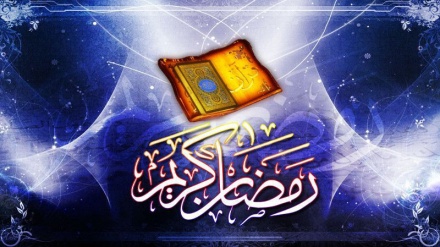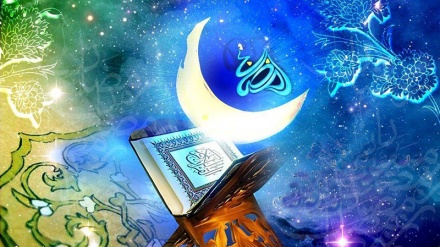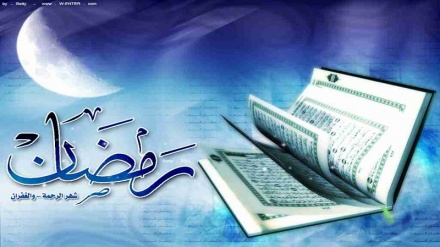Blessed Month of Ramadhan
Salaam and welcome to the 28th episode of the series “Blessed Month of Ramadhan”.
One of the blessings of the blessed month of Ramadhan is maintenance of discipline by fasters in their life. The fasters begin to fast in a known hour and also break their fast in a specific time. This coordination, reminds Muslims of the need to maintain a regular plan in all material and spiritual matters. One of the other beautiful experiences in this month is to wake up at late midnight well before the break of dawn. It can be said that by the end of the blessed month of Ramadhan, this spiritual exercise has turned into an appropriate habit for fasters. To ensure the fast is valid, one should avoid resentment, jealousy, gossips, accusations, and faultfinding, close his eyes from what is religiously forbidden and doesn’t listen to pointless remarks and depraved music.
Dear listeners, we are now in the last days of the blessed month of Ramadhan. Hopefully, God will continue to grant us the opportunity to benefit from the blessed moments of this month so that in the remaining duration, we would seize the opportunity to fast appropriately. According to Prophet Mohammad (blessings of God upon him and his progeny), the blessed month of Ramadhan is known for three features; divine kindness is decreed for the first ten days; divine forgiveness is decreed for second ten days, and the remaining nine or ten days marks provides an excellent opportunity to attain salvation from the fires of hell.
The fasters, as Guest of God, succeed in establishing a close bond with the One and Only Creator of the universe. Peace of mind and tranquility of heart are achieved in the calm and stillness of the late midnight hours before the break of dawn. Many Ulema and thinkers have seen their minds, hearts and souls enlightened through contemplation in these hours. According to hadith, worship of God during the late midnight hours leads to a special halo of light for such persons on the Day of Judgment. Let’s experience the good feeling of proximity to God during the blessed moments of late midnight until the break of dawn all year long.
Ayah 25 of Surat al-Hadid of the Holy Qur’an states:
“Certainly We sent Our Messengers with manifest proofs, and We sent down with them the Book, and the Balance, so that mankind may maintain justice; and We sent down iron, in which there is great might and uses for mankind, and so that Allah may know those who help Him and His Messengers in their absence. Indeed Allah is All-Strong, All-Mighty.”
This ayah clearly points out that the goal of the mission of divine prophets, in addition to preaching monotheism and abstinence from vices, has been to administer justice. It says God sent Prophets with manifest proofs, and to the leading ones He gave heavenly scriptures, such as the Books of Noah and Abraham, the Torah of Moses, the Evangel of Jesus, and Holy Qur’an that is the final Divine Book for the guidance of all mankind that was revealed to Last and Greatest Messenger, Prophet Mohammad (blessings of God upon him and his progeny). All these scriptures included religious teachings so that mankind would behave justly, and justice would be administered in human communities.
This ayah, after noting that God Almighty sent Prophets to establish justice in communities, notes that the Prophets, in addition to inviting people to the way of God, stood firm against bullies and corrupt power-thirsty figures. The Prophet of Islam, upon migrating to Medina, and establishment of the Islamic ruling system, expounded to the people the meaning of the ayahs of Holy Qur’an as they were gradually revealed. He also stood steadfast against the enemies of humanity, who imposed armed battles upon him. Thus, those who rise up for administration of justice should strengthen themselves to stand firm against bullies and violators of human rights.
The other important point in this ayah is the identification of those who strive in the way of God to promote divine laws in society and are not like those who stray away from the right path. So, one of the other main goals of the Prophets is test people and determine the degree of faith in them. God does not need the assistance of anyone, while everyone needs His assistance, which means the word “help” used here is allegorical and refers to those who do not spare any efforts to implement justice. In order to prove this fact, this ayah ends with the statement pointing out that Allah is All-Strong, All-Mighty, because God can destroy the enemies, and promote the Godwary in a split of a second. In other words, it is God Who has invited the righteous to help promote religion in society.
The blessed month of Ramadhan is in its waning days and hopefully the fasters have managed to seize the golden opportunities which have been raised in this sacred month for proximity to God. The fasters, in addition to the spiritual benefits of fasting, have also benefitted from maintenance of discipline and a regular dietary regimen in this blessed month. The important point is to keep the appropriate dietary regimen, after the end of the blessed month of Ramadhan. Nutritionists believe that after fasting for a month, in order to safeguard the results, a healthy diet should be taken into account. Given that in the blessed month of Ramadhan, your digestion system has rested further, it is better to avoid overeating in the first days after the blessed month of Ramadhan.
In Ramadhan, fasters try to consume healthy foods between Iftar and Sahari so that they would comply with God’s instructions with a healthy body. Continuation of this diet in other days of the year can prevent different illnesses. Consumption of bread and grains, cereals, meat stews, and fresh vegetables in addition to yoghurt, provides a complete set of nutritious foods. Consumption of dried fruits and herbal tea is another appropriate habit which takes shape in the blessed month of Ramadhan, protecting the digestion system, and preventing hypertension, while maintaining anti-bacterial and anti-tumor benefits.
In the blessed month of Ramadhan, many have got used to breaking their fast with a glass of milk. It is better to consume milk at breakfast after the blessed month of Ramadhan, and to include yoghurt and yoghurt drink at lunch and dinner, after this month. In fact, it is recommended to consume low-fat dairy products at least twice a day.
According to nutritionists, if a balanced and low-fat dietary regimen is not adopted after the blessed month of Ramadhan, the stage might be set for a surge in body fat, hypertension, weight gain, heart stroke, and cerebral apoplexy. So it is highly recommended to keep an eye on your diet after the blessed month of Ramadhan, so that one would consume breads, cereals, fruits, vegetables, milk, dairy products, meet, grains, and eggs, in addition to a law amount of liquid cooking oils. Also do not forget consumption of fruits such as peaches, plums, and apples on a daily basis. Include vegetables such as lettuce, tomatoes, cucumbers, and carrots and avoid fried foods as much as possible on a daily basis. Chew food slowly, and avoid consumption of sandwiches, crisps, cookies and chocolates.
AS/MG


